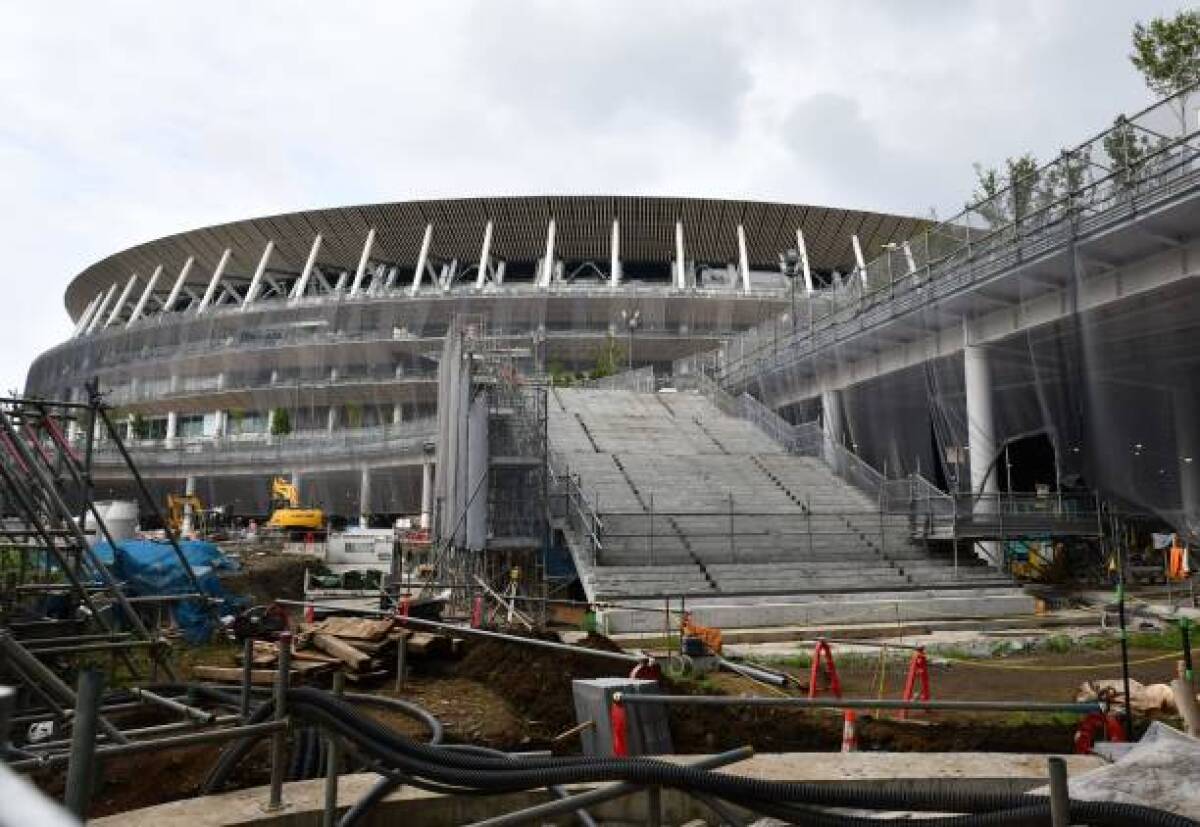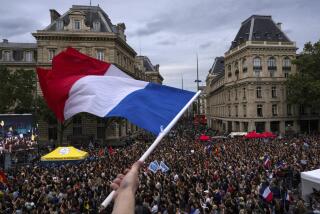Tokyo’s rough road to 2020 Summer Olympics

TOKYO — The Shinjuku neighborhood bustles at midday, its streets filled with tourists and shoppers and subway riders emerging from an underground station.
Everyone goes about their business, paying no mind to the immense construction site in their midst.
Not so long ago, the new Olympic Stadium — a centerpiece for the upcoming 2020 Summer Games — was a lightning rod for criticism in this city, with residents pushing back against its original, $2-billion version.
The first design was scrapped and replaced by one about half the price. It was part of an overall effort to control rising costs that had organizers and the government combining to spend an estimated $30 billion.
“We have been able to cut the budget,” Masa Takaya, a spokesman, said during a meeting at organizing committee headquarters last week. “We can say that Tokyo has been doing its best to deliver the Games in a sustainable way.”
Now, with the opening ceremony scheduled for a year from Wednesday, Tokyo 2020 can point to good news as fans clamor for tickets and corporations pledge billions of dollars in sponsorships.
At the stadium site, the clanging of heavy machinery is merely an echo from somewhere inside. Workers have finished the exterior, installing wooden slats and greenery meant to evoke the serenity of a traditional Japanese temple.
But some Olympic scholars continue to wonder about these Games.
“They have tried to scale back in a bunch of ways,” said Victor Matheson, a sports economist at College of the Holy Cross in Massachusetts. “We’re still looking at unofficial costs which would make this the second most-expensive Olympics in history.”
::
Timing is part of the issue.
When the International Olympic Committee selected Tokyo in 2013, its members had a reputation for choosing cities that promised to spend the most. This tendency scared away some potential hosts.
It didn’t help when Russia poured an estimated $51 billion into the 2014 Sochi Winter Games. As Matheson noted: “Fifty-one billion makes it hard for the IOC to sell the Olympics to anyone.”
Later that year, the IOC passed Agenda 2020, the first step in a campaign to make hosting more affordable, in part by encouraging the use of existing venues. Leaders referred to this as the “New Norm.”
Paris and Los Angeles reacted by submitting relatively economical bids that were chosen for the next two Summer Games, but the shift came a bit late for Tokyo, which was facing criticism back home.
Agenda 2020 “certainly accelerated” a decision by organizers and the national government to review their master plan, Takaya said.
The national stadium drew most of the attention as officials dumped British architect Zaha Hadid’s lavish design — some complained that it looked like a giant turtle — in favor of a more modest proposal from Japanese architect Kengo Kuma that was estimated to cost $1.2 billion.
Prime Minister Shinzo Abe described the change as a “legacy which the next generation can be proud of.”
Organizers cut costs in other ways, shifting events such as basketball and equestrian to existing venues, including some that dated back to the 1964 Summer Games.
All of this moved Tokyo closer in line with new IOC policies; among the 43 venues required, eight would be new, 10 would be temporary and 25 would be existing.
Two expensive projects were preserved. In addition to the stadium, organizers continued to build a sprawling athletes village at the edge of Tokyo Bay, where crews now scramble around the skeletons of high-rise buildings in the stultifying heat.
At the nearby Tokyo 2020 headquarters, two life-sized plush figures — official mascots Miraitowa and Someity — sit on chairs in the lobby.
With reports estimating overall spending by organizers and various government entities at $25 billion or more, Takaya expresses satisfaction with what his committee has done for its portion.
“We feel that with Agenda 2020, our venue master plan has certainly become more refined,” he said. “It is able to meet the public needs, the needs of this generation.”
::
Paris has estimated it can stage the 2024 Summer Games for about $8 billion in private and public money, though that number is expected to rise. L.A. 2028’s latest budget projection is about $7 billion, with organizers predicting they can generate enough revenue to cover all costs.
Given these numbers, Matheson isn’t overly enthusiastic about Tokyo.
“It’s hard for me to lavish much praise on $25 billion,” the economist said. “It’s like an arsonist who says, yes, I set fire to the house, but then I called the fire department and saved one bedroom.”
Back in 2013, during the bid phase, the Japanese forecast expenses at $7 billion. Since then, cost overruns have been accompanied by significant missteps.
Around the time officials were switching stadium designs, they had to nix the official logo because it too closely resembled one used by a Belgian theater. Then the head of the Japanese Olympic Committee, Tsunekazu Takeda, agreed to step down amid allegations that bribes were paid to secure the bid.
Even more troubling, a human rights organization reported that workers — many of them foreigners brought into the country under a program that affords them less protections than it does Japanese citizens — were being subjected to long hours and dangerous conditions at venue construction sites.
“The truth is, these are all ingrained Olympic problems,” said Jules Boykoff, a Pacific (Ore.) University political science professor who studied similar issues surrounding the 2016 Summer Olympics in Rio de Janeiro. “We’re seeing them play out in Japan.”
Despite the high-profile controversies, Takaya says the Games remain “on track.” He also dismisses budget criticisms by invoking the curious math of the Olympic movement, which divides costs and shifts them around.
Organizing committees usually focus on the operating budget — the price of running events day-to-day — and wash their hands of the billions that governments spend on infrastructure such as stadiums, roadways and hotels, which end up on a different ledger.
Tokyo 2020 takes responsibility for $5.6 billion in operational expenses, but not for the $20 billion or so that will be spent by the national and local governments. Officials also insist that Japan needed much of the infrastructure spurred by the Games.
The athletes village will be converted to apartments and condominiums in a city of 9.2 million. The stadium replaces an aging facility that had grown obsolete; for example, it no longer met the standards to host a track world championships.
None of these arguments mollify critics, who note that no matter how the accounting plays out, taxpayers will foot much of the bill.
“I feel like I know the history of the Games too well,” Boykoff said. “We should always be highly skeptical.”
::
Cicadas sing from the trees surrounding Yumenoshima Park — the site of Tokyo’s new archery venue — their thrum making a humid morning feel a little heavier.
Half of the new Tokyo 2020 venues are complete, so organizers have begun to hold test events; an international field of archers competed here last week.
“This venue is incredible,” said Brady Ellison, a world champion from the U.S. “When we went out the other night in our team gear, walking through the train station, people were saying, ‘Go USA,’ and taking pictures with us.”
Budget issues notwithstanding, the buzz here is palpable.
Tokyo 2020’s new logo — a blue, checkered circle — is plastered across the city on taxi cabs and in storefront windows. Merchandise shops are reportedly doing good business and, even in a rural prefecture 180 miles north, colorful banners fly beside the highway.
“Whenever we see the Olympics, every two years, we always see big, big excitement from the general public,” Takaya said. “The TV audience rating is extremely high compared to other parts of the world.”
This passion has translated into more than $3 billion in domestic sponsorships, three times the previous record of $1.1 billion set by London for the 2012 Summer Games. IOC executive John Coates called it “an amazing amount of money.”
When organizers held a lottery last month, 7.5 million people registered for the chance to buy 3.2 million tickets. With so many fans turned away, a second — and perhaps third — public sale is in the works.
So it remains to be seen how these Olympics will be viewed, not just during next summer’s competition but in the long run, after the cheering has subsided and Japan is left holding the tab.
Critics are dubious. Japanese officials are doggedly optimistic.
“People are absolutely passionate about having the Games next year,” Takaya said. “This is a very exciting time.”
Times staff writer Dylan Hernandez contributed to this report.
More to Read
Go beyond the scoreboard
Get the latest on L.A.'s teams in the daily Sports Report newsletter.
You may occasionally receive promotional content from the Los Angeles Times.











